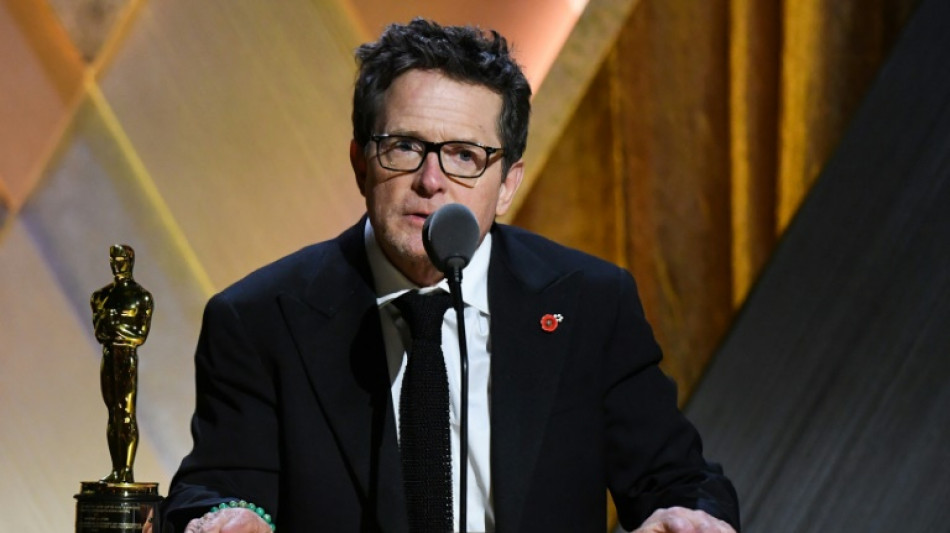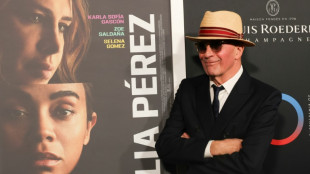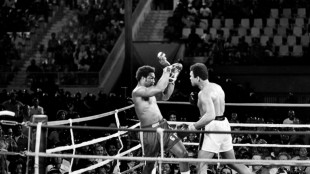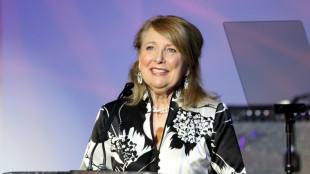
-
 De Zorzi out for 177 as S.Africa power to 413-5 against Bangladesh
De Zorzi out for 177 as S.Africa power to 413-5 against Bangladesh
-
'CEO of supercute': Hello Kitty turns 50

-
 Australia head coach McDonald handed new deal until 2027
Australia head coach McDonald handed new deal until 2027
-
Visual artist grabs 'decisive moment' to nurture Chad art scene

-
 Industrial slump leaves Germany on brink of recession
Industrial slump leaves Germany on brink of recession
-
'I'm terrified': French auteur Audiard hits Oscars trail for 'Emilia Perez'

-
 New Indonesia defence chief harks back to dictator's rule
New Indonesia defence chief harks back to dictator's rule
-
In Tennessee, the despair of gun control advocates

-
 US economy's solid growth unlikely to register at ballot box
US economy's solid growth unlikely to register at ballot box
-
'A treasure': Japan's Ohtani a hometown hero win or lose in World Series

-
 Botswana votes with ruling party seeking to extend six decades of power
Botswana votes with ruling party seeking to extend six decades of power
-
Bitcoin close to record as cautious markets eye US election

-
 Hometown hero Volpe lives dream with grand slam for Yankees
Hometown hero Volpe lives dream with grand slam for Yankees
-
Rested relief pitchers please Roberts even after Dodgers defeat

-
 UK's Labour govt prepares to deliver decisive first budget
UK's Labour govt prepares to deliver decisive first budget
-
Beijing files WTO complaint over EU's new taxes on Chinese EVs

-
 Volpe's grand slam helps Yankees avoid World Series sweep
Volpe's grand slam helps Yankees avoid World Series sweep
-
Taiwan battens down for Super Typhoon Kong-rey

-
 MotoGP world title in sight as Martin, Bagnaia set for Sepang duel
MotoGP world title in sight as Martin, Bagnaia set for Sepang duel
-
'New wave' as start-up sweeps up Thai ocean plastic

-
 Botswana votes with ruling party aiming to extend six decades of power
Botswana votes with ruling party aiming to extend six decades of power
-
How harmful are microplastics to human health?

-
 Are bioplastics really the wonder alternative to petro plastics?
Are bioplastics really the wonder alternative to petro plastics?
-
EU's extra tariffs of up to 35.3% on Chinese EVs angers Beijing

-
 Rumble in the Jungle remembered after 50 years
Rumble in the Jungle remembered after 50 years
-
Trump risks backlash with anti-trans ads targeting Harris

-
 Alzheimer's patient 'relieved' at Quebec's assisted suicide policy shift
Alzheimer's patient 'relieved' at Quebec's assisted suicide policy shift
-
Who should get paid for nature's sequenced genes?

-
 Bodies found as torrential rains slam Spain
Bodies found as torrential rains slam Spain
-
Harris urges US to turn page on Trump 'chaos' in mass White House rally

-
 Climate change driving 'record threats to health': report
Climate change driving 'record threats to health': report
-
Harris warns of 'obsessed' Trump power grab at mass Washington rally

-
 Harris warns against Trump's power grab bid in final election warning
Harris warns against Trump's power grab bid in final election warning
-
Southampton, Brentford scrape into League Cup quarter-finals

-
 PGA players council seeks smaller fields, fewer full tour spots
PGA players council seeks smaller fields, fewer full tour spots
-
Napoli extend lead at top of Serie A with win at AC Milan

-
 Harris to slam 'unstable' Trump at Washington rally
Harris to slam 'unstable' Trump at Washington rally
-
Jennifer Lopez to boost Harris at glitzy Las Vegas event

-
 Global stocks mixed as markets await Big Tech results
Global stocks mixed as markets await Big Tech results
-
Seven missing as torrential rains slam Spain

-
 Three-person crew blasts off for China's Tiangong space station
Three-person crew blasts off for China's Tiangong space station
-
Google reports strong growth driven by AI, Cloud

-
 Kyiv announces new mobilisation drive as Russia advances
Kyiv announces new mobilisation drive as Russia advances
-
Release of new single featuring late One Direction star postponed

-
 Alcaraz breezes through opener at Paris Masters
Alcaraz breezes through opener at Paris Masters
-
Bolivia 'going from bad to worse': At the barricades with Morales supporters

-
 Biden unveils $3 bn US ports boost, takes aim at Trump
Biden unveils $3 bn US ports boost, takes aim at Trump
-
EU slaps extra tariffs of up to 35.3% on Chinese EVs

-
 England boss Borthwick has no qualms over starting Slade against All Blacks
England boss Borthwick has no qualms over starting Slade against All Blacks
-
'Tootsie' star Teri Garr dies aged 79

| NGG | -1.35% | 65.12 | $ | |
| RELX | -0.52% | 47.91 | $ | |
| RBGPF | 100% | 62.35 | $ | |
| SCS | -3.11% | 12.21 | $ | |
| RYCEF | 0.55% | 7.25 | $ | |
| BCC | -5.3% | 131.64 | $ | |
| CMSC | -0.65% | 24.57 | $ | |
| CMSD | -0.16% | 24.84 | $ | |
| RIO | 0.6% | 66.58 | $ | |
| VOD | -2.8% | 9.28 | $ | |
| BCE | -0.71% | 32.46 | $ | |
| BTI | -1.31% | 34.46 | $ | |
| JRI | -0.69% | 12.98 | $ | |
| GSK | 0.76% | 38.17 | $ | |
| AZN | -1.05% | 75.22 | $ | |
| BP | -5.76% | 29.36 | $ |

'Back to the Future' star and Parkinson's activist Fox gets honorary Oscar
Michael J. Fox was awarded an honorary Oscar Saturday for his campaign to fund Parkinson's research since being diagnosed with the neurodegenerative disease at the peak of his acting career.
Fox received the Academy of Motion Picture Arts and Sciences' annual statuette for humanitarian work by a film industry figure at a black-tie gala crammed with Hollywood's biggest stars in Los Angeles.
"You're making me shake, stop it," joked Fox as he received a standing ovation, before describing his award as "a wholly unexpected honor."
Canadian actor Fox, 61, shot to stardom in the "Back to the Future" films while portraying time-traveling high-school student Marty McFly.
The trilogy between 1985 and 1990 thrust DeLorean time machines and gravity-defying hoverboards into the popular imagination.
In 1991, at the age of 29, Fox was diagnosed with Parkinson's and told he had 10 years left to work.
About 10 million people worldwide have Parkinson's, which erodes motor functions.
Woody Harrelson, who starred alongside Fox in the film "Doc Hollywood" at the time of his diagnosis, told the audience Saturday: "I just couldn't believe it because there's such an invincible, superhuman quality about Mike.
"Well, he never missed a step, never wallowed in self-pity... instead he turned a chilling diagnosis into a courageous mission," he added.
Fox, who first achieved fame on NBC's 1980s sitcom "Family Ties," publicly disclosed his illness in 1998, during the run of his second hit TV series "Spin City."
He semi-retired a few years later, dedicating himself to his Parkinson's foundation and raising more than $1 billion for research.
"It was clear that an aging, under-served patient base could use some help," he said.
"There was nothing heroic about what I did," said Fox.
Fox, who permanently retired from acting in 2020, has suffered multiple broken bones and injuries from falls in recent months, requiring surgery on his shoulder.
But he walked to and from the stage Saturday, asking his wife and former "Family Ties" co-star Tracy Pollan to help carry his statuette off.
- 'Thank the Academy' -
The honorary Oscars are handed out every year to recognize lifetime achievement, and were spun off into a separate event in 2009 to declutter the main show's packed schedule.
Previous winners of Fox's Jean Hersholt Humanitarian Award -- handed out by the Academy most years since 1957 -- include Angelina Jolie, Oprah Winfrey and Elizabeth Taylor.
Also awarded a golden statuette for career achievement on Saturday was Diane Warren, the songwriter behind hits such as Aerosmith's "I Don't Want to Miss a Thing," who has been nominated for 13 competitive Oscars without winning.
"I've waited 34 years to say this -- I'd like to thank the Academy," Warren said to raucous applause.
"I've had a lot of speeches that got crumpled up in my pocket," she joked.
Peter Weir, the Australian director who made global smash hits such as "Witness," "Dead Poets Society" and The Truman Show," made a rare return to Hollywood to collect his Oscar.
Euzhan Palcy, a filmmaker from the French-speaking Caribbean island of Martinique, received a statuette for a career including "A Dry White Season" -- her 1989 film about South African apartheid that lured Marlon Brando out of retirement.
Palcy, who has largely stopped making films, said she became "so tired of being told I was a pioneer" and "hearing praise for being the first of too many firsts but denied the chance to make the movies" she wanted to make.
"My stories are not black, my stories are not white -- they are universal, they are colorful," she said.
O.Krause--BTB

